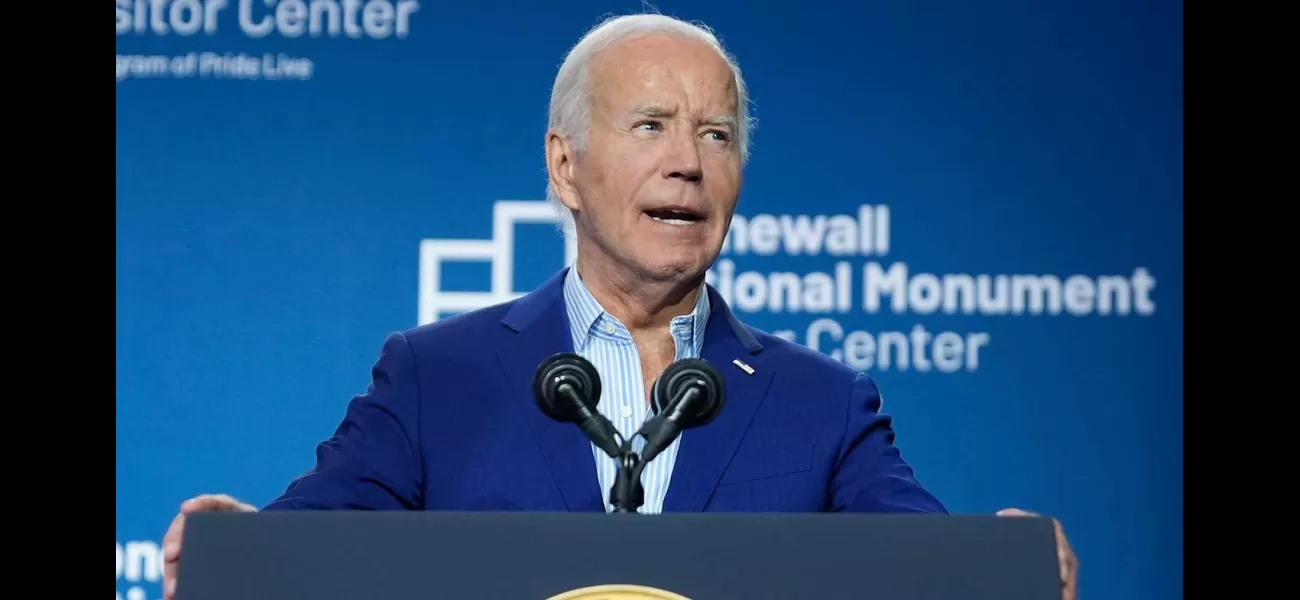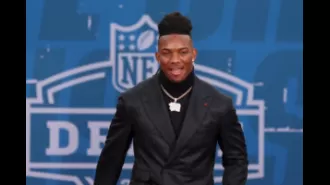What if Biden withdraws from the presidential race?
Concerns arise among Democrats as Joe Biden's lackluster debate raises doubts about his ability to continue in the presidential race.
June 29th 2024.

Following Joe Biden's underwhelming performance in the debate, concerned Democrats began to question whether he would continue as the presidential nominee. This was not a simple decision, as Biden had already been chosen as the presumptive nominee by the Democratic party and was the clear favorite among primary voters. He had faced little opposition during the primaries and had won the majority of the party's delegates. It seemed highly unlikely that he would be forced out of the race against his will.
David Axelrod, a CNN analyst and Democratic strategist, shared his thoughts on Biden's debate performance, saying, "This isn't the '60s. Voters choose the nominee. He is the nominee." This statement highlights the current primary system, which gives power to primary voters rather than party leaders. This system was put in place after Democrats faced backlash for selecting Vice President Hubert Humphrey as their nominee in 1968. At the time, there was discontent over the fact that Humphrey represented a continuation of President Lyndon Johnson's Vietnam policy, which led to violence at the Democratic National Convention in Chicago.
If Biden were to withdraw from the race in 2024, things would be very different. However, the Democratic convention will be held in Chicago in August, which brings back memories of the tumultuous 1968 convention. As we reported back in February, if a leading candidate were to drop out of the race after most primaries or even during the convention, individual delegates would have to select the party's nominee on the convention floor. This would bring attention to the usually overlooked question of who these delegates are.
These delegates are not only pledged to vote for Biden, but they have also been approved by his campaign. This means that if a majority of convention delegates were to choose a new nominee, it would require a significant number of Biden's own supporters to defect. If Biden were to drop out, it would largely be his own backers who would be responsible for selecting his replacement.
There are many potential candidates who could replace Biden, such as Vice President Kamala Harris, who would likely be a top contender. However, there could also be other candidates who previously argued they could run a more effective campaign against former President Donald Trump. For example, California Gov. Gavin Newsom, who has shown unwavering support for Biden after the debate, could potentially challenge Harris at the convention. This process of selecting a replacement could be divisive and messy, as delegates would have to vote after intense lobbying.
Additionally, there is another group to consider: the "superdelegates." These are about 700 senior party leaders and elected officials who are automatically delegates to the convention based on their position. Under normal party rules, they cannot vote on the first ballot if they could sway the nomination, but they are free to vote on subsequent ballots.
If a candidate were to drop out after the convention, it would be a drastic event. Both parties have different methods for handling this situation. For Democrats, the Democratic National Committee is empowered to fill a vacancy on the national ticket after the convention, with input from Democratic governors and congressional leadership. For Republicans, the Republican National Committee can either reconvene the national convention or select a new candidate.
In the case of a candidate dropping out after the convention, it is not guaranteed that the running mate would automatically become the nominee. According to a Congressional Research Service memo, neither party requires the presidential candidate's running mate to be elevated to the top of the ticket, but it would likely be the most logical choice.
In modern times, there has been a situation where a candidate left the race after the convention. In 1972, Senator Thomas Eagleton, who was the Democratic nominee for vice president, stepped aside after it was revealed that he had been treated for mental illness. The DNC had to hold a meeting to confirm Sargent Shriver as George McGovern's running mate.
If a president-elect were to become incapacitated after the election, timing would be crucial. According to the Constitution, it is the electors who technically cast votes for the presidency. Some states require that they vote for the winner of the election in their state, while others give them leeway. The 20th Amendment states that if a president-elect dies, the vice president-elect would become president. However, there could be some ambiguity about when exactly a person becomes president-elect. Is it after the electors meet in December or after Congress meets to count Electoral College votes on January 6?
These are important questions to consider, especially in light of the big question facing Democrats after Biden's debate performance. Will he continue as the nominee, or will someone else take his place? Only time will tell.
David Axelrod, a CNN analyst and Democratic strategist, shared his thoughts on Biden's debate performance, saying, "This isn't the '60s. Voters choose the nominee. He is the nominee." This statement highlights the current primary system, which gives power to primary voters rather than party leaders. This system was put in place after Democrats faced backlash for selecting Vice President Hubert Humphrey as their nominee in 1968. At the time, there was discontent over the fact that Humphrey represented a continuation of President Lyndon Johnson's Vietnam policy, which led to violence at the Democratic National Convention in Chicago.
If Biden were to withdraw from the race in 2024, things would be very different. However, the Democratic convention will be held in Chicago in August, which brings back memories of the tumultuous 1968 convention. As we reported back in February, if a leading candidate were to drop out of the race after most primaries or even during the convention, individual delegates would have to select the party's nominee on the convention floor. This would bring attention to the usually overlooked question of who these delegates are.
These delegates are not only pledged to vote for Biden, but they have also been approved by his campaign. This means that if a majority of convention delegates were to choose a new nominee, it would require a significant number of Biden's own supporters to defect. If Biden were to drop out, it would largely be his own backers who would be responsible for selecting his replacement.
There are many potential candidates who could replace Biden, such as Vice President Kamala Harris, who would likely be a top contender. However, there could also be other candidates who previously argued they could run a more effective campaign against former President Donald Trump. For example, California Gov. Gavin Newsom, who has shown unwavering support for Biden after the debate, could potentially challenge Harris at the convention. This process of selecting a replacement could be divisive and messy, as delegates would have to vote after intense lobbying.
Additionally, there is another group to consider: the "superdelegates." These are about 700 senior party leaders and elected officials who are automatically delegates to the convention based on their position. Under normal party rules, they cannot vote on the first ballot if they could sway the nomination, but they are free to vote on subsequent ballots.
If a candidate were to drop out after the convention, it would be a drastic event. Both parties have different methods for handling this situation. For Democrats, the Democratic National Committee is empowered to fill a vacancy on the national ticket after the convention, with input from Democratic governors and congressional leadership. For Republicans, the Republican National Committee can either reconvene the national convention or select a new candidate.
In the case of a candidate dropping out after the convention, it is not guaranteed that the running mate would automatically become the nominee. According to a Congressional Research Service memo, neither party requires the presidential candidate's running mate to be elevated to the top of the ticket, but it would likely be the most logical choice.
In modern times, there has been a situation where a candidate left the race after the convention. In 1972, Senator Thomas Eagleton, who was the Democratic nominee for vice president, stepped aside after it was revealed that he had been treated for mental illness. The DNC had to hold a meeting to confirm Sargent Shriver as George McGovern's running mate.
If a president-elect were to become incapacitated after the election, timing would be crucial. According to the Constitution, it is the electors who technically cast votes for the presidency. Some states require that they vote for the winner of the election in their state, while others give them leeway. The 20th Amendment states that if a president-elect dies, the vice president-elect would become president. However, there could be some ambiguity about when exactly a person becomes president-elect. Is it after the electors meet in December or after Congress meets to count Electoral College votes on January 6?
These are important questions to consider, especially in light of the big question facing Democrats after Biden's debate performance. Will he continue as the nominee, or will someone else take his place? Only time will tell.
[This article has been trending online recently and has been generated with AI. Your feed is customized.]
[Generative AI is experimental.]
0
0
Submit Comment





